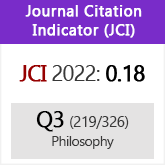Crítica a la naturalización del deontologismo en la teoría del proceso dual del juicio moral de Joshua Greene
DOI:
https://doi.org/10.3989/Isegoria.2018.058.11Palabras clave:
Juicio moral, deontologismo, neuroética, Joshua GreeneResumen
En este trabajo me propongo cuestionar la tesis neuroética de Joshua Greene acerca del carácter esencialmente emocional de los llamados “juicios morales deontológicos”. Centrándome en su teoría del proceso dual del juicio moral cuestiono que solo y principalmente los juicios morales deontológicos sean intuitivos y no reflexivos. En segundo lugar, cuestiono que el juicio utilitarista pueda ser asimilable al cálculo matemático y que el juicio deontológico se reduzca al factor no reflexivo de la emoción. La principal objeción que planteo al naturalismo de Greene es pretender eliminar la justificación filosófica acerca de la validez moral que lleva a cabo el deontologismo en Kant, reduciéndolo exclusivamente a factores psicológicos y neurofisiológicos vinculados con la emoción.
Descargas
Citas
Amir, D. I. & Mitchell, J. P. (2011) "The Default Network distinguishes construcals of proximal versus distal events", Journal of Cognitive Neuroscience 23:10, pp. 2945-2955. https://doi.org/10.1162/jocn_a_00009 PMid:21391760
Apel, K.-O., Burkhart, H., Böhler, D. (2001), Prinzip Mitverantwortung. Grundlage für Ethik und Pädagogik, Wurzburg, Königshausen y Neumann.
Cortina, A. (2007), Ética de la razón cordial, Oviedo, Nobel. PMCid:PMC2600418
Cortina, A. (1996), "El estatuto de la ética aplicada. Hermenéutica crítica de las actividades humanas", Isegoría 13, pp. 119-134. https://doi.org/10.3989/isegoria.1996.i13.228
Cortina, A. (2011), Neuroética y neuropolítica. Sugerencias para la educación moral, Madrid, Tecnos.
Cortina, A. (2012), Guía Comares de neurofilosofía práctica, Granada, Comares.
Baron, J. (1994), "Nonconsequentialist decisions", Behavioral and Brain Sciences , 14, pp. 1-42. https://doi.org/10.1017/S0140525X0003301X
Greene, J., Sommerville, R. B., Nystrom, L. E., Darley, J. M., Cohen, J. (2001), "An fMRI Investigation of Emotional Engagement in Moral Judgment", Science 293, pp. 2105-2108. https://doi.org/10.1126/science.1062872 PMid:11557895
Gracia, J. (2016), "¿Incurre la teoría del proceso dual del juicio moral de Joshua Greene en falacia naturalista?", Pensamiento, 273, pp. 809-826.
Greene, J., Nystrom, E., Engell, A. D., Darley, J. M., Cohen, J. D. (2004), "The Neural Bases of Cognitive Conflict and Control in Moral Judgment", Neuron 44, pp. 389-400. https://doi.org/10.1016/j.neuron.2004.09.027 PMid:15473975
Greene, J. (2008a), "The Secret Joke of Kant's Soul", en Walter Sinnot-Armstrong (ed.), Moral Psychology 3, The Neuroscience of Morality. Emotion, Brain Disorders, and Development, Cambridge, MIT Press, pp. 35-79. PMid:18940898 PMCid:PMC2604784
Greene, J. (2008b), "Reply to Mikhail and Timmons", en W. Sinnot-Armstrong, Moral Psychology 3, The Neuroscience of Morality. Emotion, Brain Disorders, and Development, Cambridge, MIT Press, pp. 105-117.
Greene, J. (2009), "the Cognitive Neuroscience of Moral Judgment", en M. Gazzaniga (ed.) The Cognitive Neuroscience IV . Cambridge, MIT Press.
Greene, J. (2012), "Del 'es' neuronal al 'debe' moral: ¿Cuáles son las implicaciones morales de la psicología moral neurocientífica"?, en A. Cortina (ed.) Neurofilosofía Práctica, Granada, Comares.
Greene, J. (2013), Moral Tribes. Emotion, Reason and the Gap between us and them, Pinguin, Habermas, J. (1991), "Vom pragmatischen, ethischen und moralischen Gebrauch der praktischen Vernunft", en Erläuterung zur Diskursethik, Frankfurt/Main, Suhrkamp, pp. 100-118.
Greene, J. (2014), "Beyond Point-and-Shoot Morality: Why Cognitive (Neuro)Science Matters for Ethics", Ethics 124 (4), July, 2014, pp. 695-726. https://doi.org/10.1086/675875
Haidt, J. ([2001] 2012), "El perro emocional y su cola racional: un enfoque intuicionista social del juicio moral", en A. Cortia (ed.) Neurofilosofía práctica, Granada, Comares, pp. 159-261.
Kahane, G., Shackel, N. (2010), "Methodological issues in the neuroscience of moral judgment". Mind and Language, 25(5), 561-82. https://doi.org/10.1111/j.1468-0017.2010.01401.x PMid:22427714 PMCid:PMC3303120
Kahane, G., Wiech, K., Shackel, N., Farias, M., Savulescu, J., Tracey, I. (2012), "The neural basis of intuitive and counterintuitive moral judgments". Social Cognitive and Affective Neuroscience , 7(4), pp. 393-402. https://doi.org/10.1093/scan/nsr005 PMid:21421730 PMCid:PMC3324565
Kahane, G. (2015), "Sidetracked by trolleys: Why sacrificial moral dilemas tell us Little (or nothing) about utilitarian judgment". Social Neuroscience, 10, 5, 551-560. https://doi.org/10.1080/17470919.2015.1023400 PMid:25791902 PMCid:PMC4642180
Kahneman, D. (2011), Thinking, Fast and Slow, New York, Farrar, Straus and Giroux. PMid:21714386
Kamm, F. M. (2009), "Neuroscience and Moral Reasoning: A Note on Recent Research", Philosophy and Public Affairs 37, pp. 330-345. https://doi.org/10.1111/j.1088-4963.2009.01165.x
Kant, I. (1911), Grundlegung zur Metaphysic der Sitten, en Gesammelte Schriften, Akademie-Ausgabe, W. de Gruyter, Berlin, vol. IV.
Kant, I. (1913), Kritik der praktischen Vernunft, en Gesammelte Schriften, Akademie- Ausgabe, W. de Gruyter, Berlin, vol. V.
Kant, I. (1914), Die Metaphysics der Sitten, en Grundlegung zur Metaphysic der Sitten, en Gesammelte Schriften, Akademie- Ausgabe, W. de Gruyter, Berlin, vol. VI.
Alfano, M. y Loeb, D. (2014), "Experimental Moral Philosophy", en Edward N. Zalta (ed.), The Stanford Encyclopedia of Philosophy http://plato.stanford.edu/archives/sum2016/entries/experimental-moral/
Loewenstein, G. (1996), "Out of Control: Visceral Influences on the Behavior", Organizacional Behavior and Human Decision Processes , 65, 3, pp. 272-292. https://doi.org/10.1006/obhd.1996.0028
Metcalfe, J. y Mischel, W. (1999), "A Hot/Cool System Analysis of Delay of Gratification: Dynamics of Willpower", Psychological Review 106, 1, pp. 3-19. https://doi.org/10.1037/0033-295X.106.1.3 PMid:10197361
Paxton, J. M., Ungar, L., Greene, J. D. (2011), "Reflection and reasoning in moral judgment", Cognitive Science, 36, pp. 163–77. https://doi.org/10.1111/j.1551-6709.2011.01210.x PMid:22049931
Paxton, J. M., Bruni, T., Greene, J. D. (2014), "Are 'counter-intuitive' deontological judgments really counter-intuitive? An empirical reply to Kahane et al. (2012)", Social Cognitive and Affective Neuroscience , 9 (9), pp. 1368-1371. https://doi.org/10.1093/scan/nst102 PMid:23887818 PMCid:PMC4158358
Ricoeur, P. (1990), "Ética y Moral", Revista portuguesa de Filosofía, pp. 5-17.
Timmons, T. (2008), "Towards a Sentimentalist Deontology", en Walter Sinnot-Armstrong, Moral Psychology 3, The Neuroscience of Morality. Emotion, Brain Disorders, and Development, Cambridge, MIT Press, pp. 93-104.
Descargas
Publicado
Cómo citar
Número
Sección
Licencia
Derechos de autor 2018 Consejo Superior de Investigaciones Científicas (CSIC)

Esta obra está bajo una licencia internacional Creative Commons Atribución 4.0.
© CSIC. Los originales publicados en las ediciones impresa y electrónica de esta Revista son propiedad del Consejo Superior de Investigaciones Científicas, siendo necesario citar la procedencia en cualquier reproducción parcial o total.Salvo indicación contraria, todos los contenidos de la edición electrónica se distribuyen bajo una licencia de uso y distribución “Creative Commons Reconocimiento 4.0 Internacional ” (CC BY 4.0). Puede consultar desde aquí la versión informativa y el texto legal de la licencia. Esta circunstancia ha de hacerse constar expresamente de esta forma cuando sea necesario.
No se autoriza el depósito en repositorios, páginas web personales o similares de cualquier otra versión distinta a la publicada por el editor.














